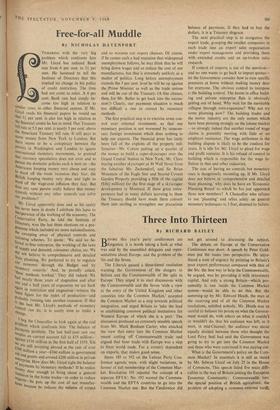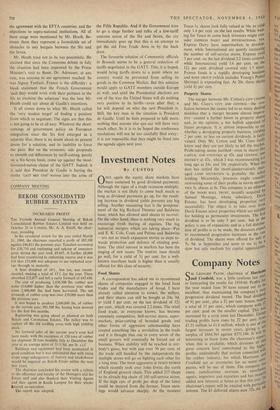Three Into Thirteen
By RICHARD BAILEY EFORE this year's party conferences are D forgotten, it is worth taking a look at what was said by the assembled delegates and repre- sentatives about Europe, and the problem of the Six and the Seven.
The Liberals passed a three-tiered resolution warning the Government of the dangers to Britain and the Commonwealth of the split in Europe. They urged it to start discussions with the Commonwealth and the Seven 'with a view to the entry of the United Kingdom and other countries into the Common Market,' accepted the Common Market as a step towards political integration, and urged Britain to 'take the lead in establishing common political institutions for Western Europe of which she is a part.' The discussion produced an extremely sensible speech from Mr. Mark Bonham Carter, who attacked the view that entry into the Common Market meant cutting off Commonwealth trade and argued that freer trade with Europe was a step to freer world trade. For a country dependent on exports, that makes good sense.
Items 189 to 192 on the Labour Party Con- ference agenda were, with slight variations, in favour of full membership of the Common Mar- ket. Resolution 191 rejected 'the concept of a separate EFTA'; No. 192 wanted the Common- wealth and the EFTA countries to go into the Common Market too. But the Conference did not get around to discussing the subject.
The debate on Europe at the Conservative Conference was short. A speech by Peter Gold- man put the issues into perspective. He intro- duced a note of urgency by pointing to Britain's poor export performance compared with that of the Six; the best way to help the Commonwealth, he argued, was by providing it with investment capital. And only a strong Britain—which pre- sumably is one inside the Common Market system—would be able to dd this. But the summing-up by Mr. Edward Heath, the man at the receiving end of all the Common Market resolutions, satisfied nobody. Mr. Heath was so careful to balance his points on whit the Govern- ment would do, with others on what it couldn't or wouldn't do, that his audience was left, as it were, in mid-Channel; the audience was about equally divided between those who thought the Lord Privy Seal had said the Government was going to try to get into the Common Market and those who were convinced it was staying out.
What is the Government's policy on the Com- mon Market? In essentials it is still as stated by Mr. Selwyn Lloyd on July 25 in the House of Commons. This speech listed five main diffi- culties in the way of Britain joining the European Economic Community : Commonwealth ties; the special position of British agriculture; the problem of adopting a common external tariff; the agreement with the EFTA countries; and the objections to supra-national institutions. All of these snags were mentioned by Mr. Heath. Be- tween them they represent a formidable set of obstacles to any bargain between the Six and the Seven.
Mr. Heath tried not to be too pessimistic. He claimed that since the Commons debate in July the situation had been improved by the Prime Minister's visit to Bonn. Dr. Adenauer, at any rate, was anxious to see agreement reached. So was Signor Fanfani. France is the difficulty: a bleak statement that the French Government `said they would work with their partners in the Six to examine the solutions' was the best Mr. Heath could say about de Gaulle's intentions.
It all comes down to what Mr. Heath called the 'very modest target' of finding a position from which to negotiate. The signs are that this is not going to be at all easy. Whatever the short- comings of government policy on European integration since the Six ,first emerged as a separate bloc, there is no doubt about its present desire for a solution, and its inability to force the pace. But on the economic side proposals to smooth out differences by tariff-cutting, purely on a. Six-Seven basis, come up against the most- favoured-nation clause of the GATT. Indeed, it is said that President de Gaulle is having the motto `GATT MIT UNS' woven into the arms of
the Fifth Republic. And if the Government tries to go a stage further and talks of a low-tariff customs union of the Six and Seven, the cry immediately goes up' that this is an attempt to get the old Free Trade Area in by the back door.
The favourite solution of Community officials in Brussels seems to be a general reduction of tariffs negotiated in the GATT. This, it is hoped, would bring tariffs down to a point where no country would be prevented from selling its goods in the Common Market. But this solution would apply to GATT members outside Europe as well; and until the Presidential elections are out of the way the United States will do nothing very positive to its tariffs—even after that, a lot will depend on who the new President is. Still, the key man in the situation is President de Gaulle. Until he feels prepared to talk more, nothing that anyone else can say will have very much effect. So it is to be hoped the conference resolutions will not be too carefully filed away : it is not impossible that they. might be fitted into the agenda again next year.















































 Previous page
Previous page